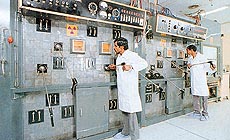Wake Up and Smell the Disaster
Early in this contest, I received a great question. "Anonymous" asked,
"Do you feel that the American people will willingly accept a national energy policy that actually addresses the major realities of the geopolitical economic conundrum that is global energy supply? Are americans really going to drive less or stop being so mindlessly wasteful of energy? Has anyone's energy policy in the US even grappled with the larger questions? Or do we just pay lipservice to the subject while our servicemen and women lose their lives defending our interests elsewhere?"

This question was so on-point that I saved my response to it for my final post. The wait nearly killed me, as I feel that this question uncovers a deeper, uglier issue at hand. This question not only considers the current energy issues facing Americans, but it also considers the selfish rational that is holding a progressive energy movement back.
Unfortunately, I do not feel that the majority of Americans will accept such an energy policy unless it offers highly rewarding instant gratification. If Americans are in any way put out by the energy policy's terms and conditions, such acceptance will be hard to come by. We are all too busy trying to satisfy our own insatiable appetites. This hunger leads to wasteful energy consumption and rash decisions. Small steps such as buying energy efficient cars or being less wasteful at home have hardly been implemented by the vast majority of American consumers. At this point, it is very important to consider the cost of our irresponsibility. This price can be paid in many forms. At the risk of sparking a political discussion, we must acknowledge the fact that such a price is not only paid in dollar and cents increments. In fact, the monetary cost should be our last concern. Crude oil has not only become scarce in the oil wells of the Permian Basin of West Texas. Like any nonrenewable resource, the constant consumption of oil will eventually lead to its disappearance. That's why it's called "nonrenewable," folks. I find it absolutely frightening that despite the many warnings that we are headed for a terrible collision, many Americans continue to selfishly speed through the flashing red light.
At this point, it is very important to consider the cost of our irresponsibility. This price can be paid in many forms. At the risk of sparking a political discussion, we must acknowledge the fact that such a price is not only paid in dollar and cents increments. In fact, the monetary cost should be our last concern. Crude oil has not only become scarce in the oil wells of the Permian Basin of West Texas. Like any nonrenewable resource, the constant consumption of oil will eventually lead to its disappearance. That's why it's called "nonrenewable," folks. I find it absolutely frightening that despite the many warnings that we are headed for a terrible collision, many Americans continue to selfishly speed through the flashing red light.
Brash American consumption is quickly helping to destroy the environment, but "for the owners of today's gas-guzzlers, it is easy to see this as something for the far-distant future, an irrelevance that will not affect their lives for many years to come."
-Robert Plummer, BBC News Business Reporter

All Americans must acknowledge the simple truth that the decisions that are made today will affect our childrens' tomorrows.

I would like to end this post by thanking each of my readers for their encouragement and support during this contest. I appreciate everyone's kind words, and no matter the outcome, this has been a fantastic learning experience.
I wish that it had not taken the prospect of an amazing job shadow with the United States Energy Department to better educate me on the energy subject, but I hope that my experience will motivate others, who like me could learn a lot more on the subject, to do the research necessary for a change to be brought about.
 -Ashley L. Driver
-Ashley L. Driver

 Don't get me wrong, I think that nuclear weapons are a necessary evil, but I am still saddened by the inevitable threat that they will always pose. The Nuclear Information and Resource Service "...aims to educate wider audiences about the connection between nuclear power and nuclear weapons and the parallel pathways to a safer world free from these dual dangers."
Don't get me wrong, I think that nuclear weapons are a necessary evil, but I am still saddened by the inevitable threat that they will always pose. The Nuclear Information and Resource Service "...aims to educate wider audiences about the connection between nuclear power and nuclear weapons and the parallel pathways to a safer world free from these dual dangers." 
 The current membership includes "...28 countries, in Europe, North America and the Asia-Pacific region." "The Nuclear Energy Agency (NEA) is a specialized agency within the Organization for Economic Co-operation and Development (OECD), an intergovernmental organization of industrialised countries, based in Paris, France."
The current membership includes "...28 countries, in Europe, North America and the Asia-Pacific region." "The Nuclear Energy Agency (NEA) is a specialized agency within the Organization for Economic Co-operation and Development (OECD), an intergovernmental organization of industrialised countries, based in Paris, France." The NEA's mission "... is to assist its Member countries in maintaining and further developing, through international co-operation, the scientific, technological and legal bases required for the safe, environmentally friendly and economical use of nuclear energy for peaceful purposes."
The NEA's mission "... is to assist its Member countries in maintaining and further developing, through international co-operation, the scientific, technological and legal bases required for the safe, environmentally friendly and economical use of nuclear energy for peaceful purposes." In conclusion...
In conclusion...
 My other posts urge Americans to decrease their reliance upon all four of these sources, but I do not fear the scarcity of nuclear energy like I do that of the remaining three sources. (coal, natural gas, and renewable resources)
My other posts urge Americans to decrease their reliance upon all four of these sources, but I do not fear the scarcity of nuclear energy like I do that of the remaining three sources. (coal, natural gas, and renewable resources) 













 What can the United States learn from Brazil's use of biofuel?
What can the United States learn from Brazil's use of biofuel? -quotes taken directly from
-quotes taken directly from Does Brazil serve as an adequate model for comparison on the biofuel issue?
Does Brazil serve as an adequate model for comparison on the biofuel issue? -quotes taken directly from
-quotes taken directly from What other countries use biofuel?
What other countries use biofuel? -quotes taken directlyfrom
-quotes taken directlyfrom I could not agree more that biofuel offers endless possibilities, and it would be a terrible mistake not to investigate these options further. Biofuel can be made from a variety of materials, and its use is not the least bit limited.
I could not agree more that biofuel offers endless possibilities, and it would be a terrible mistake not to investigate these options further. Biofuel can be made from a variety of materials, and its use is not the least bit limited.  Biofuel can be derived from a variety of sources including (but not limited to) corn, sugar cane, soybean, waste vegetable oil, and wheat. The ease with which the fuel alternative can be made demands that citizens of the world, not just the United States, become much more familiar with its many benefits.
Biofuel can be derived from a variety of sources including (but not limited to) corn, sugar cane, soybean, waste vegetable oil, and wheat. The ease with which the fuel alternative can be made demands that citizens of the world, not just the United States, become much more familiar with its many benefits.














